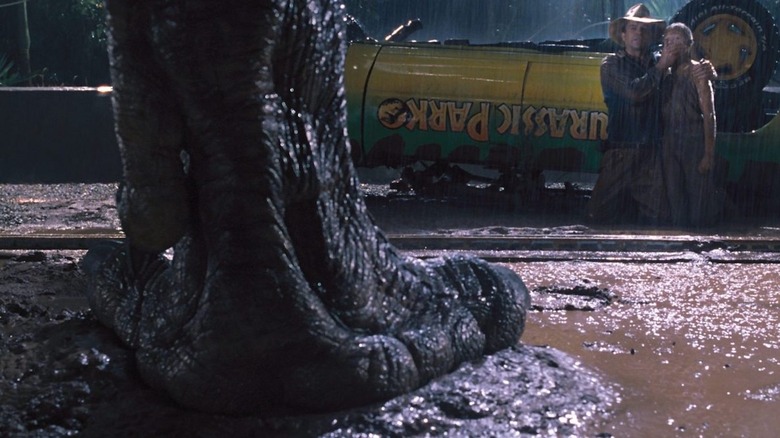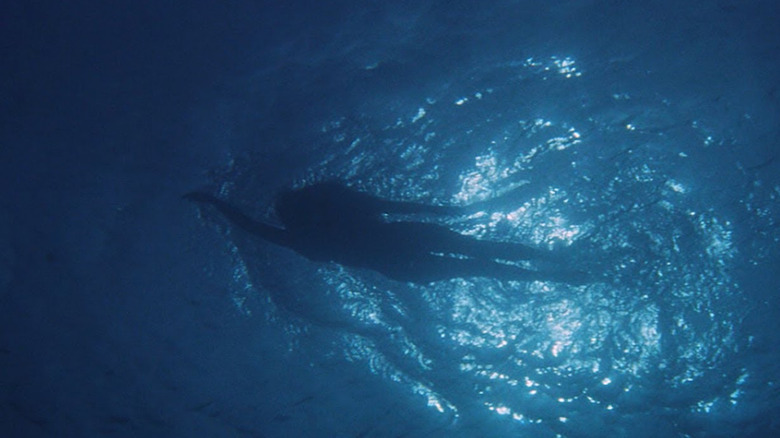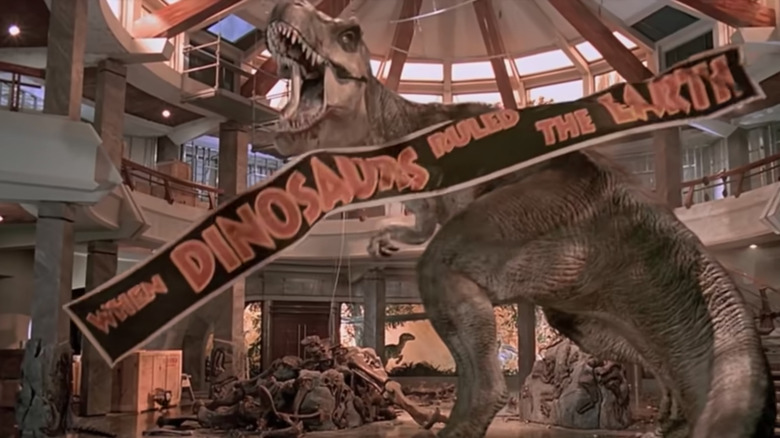Jaws Scared Steven Spielberg Into Cutting A Wet And Wild Jurassic Park Scene
A troublesome production doesn't always mean a bad film. Case in point, "Jaws." The 159-day-long shoot went over budget and behind schedule, with many of the problems stemming from the star special effect: "Bruce" the mechanical shark. The making of "Jaws" was so eventful that there have been multiple books and a stage play recounting it. And yet, the film was still, to put it mildly, a success.
The lessons that director Steven Spielberg learned on "Jaws" influenced how he would make "Jurassic Park" almost 20 years later. According to Joseph McBride's "Steven Spielberg: A Biography," the director's goal with "Jurassic Park" was, "to make a good sequel to 'Jaws.' On land." Some unpleasant memories from the "Jaws" shoot even caused Spielberg to scrap a planned set-piece featuring a swimming T. Rex.
The deleted T. Rex scene
Compared to Michael Crichton's original novel, Spielberg's "Jurassic Park" is stripped down to the essentials. However, there were plans to include one of the novel's set-pieces that were far enough along for it to be storyboarded. The scene would involve Dr. Grant (Sam Neill), Lex (Ariana Richards), and Tim (Joseph Mazzello) having to sneak past a sleeping T. Rex. The trio manages to inflate a nearby life raft and set sail on the river, but Lex decides to trash talk the T. Rex. The dinosaur wakes up and dives in after them, but its path is blocked by a wall of trees. There's another leftover from the novel in there too: in the storyboards, Lex is drawn to be younger than Tim, whereas in the final film it's the other way around.
David Koepp, co-writer of "Jurassic Park," mentioned the scene and its deletion to the ReelBlend podcast. While recalling Spielberg showing him the film's storyboards, Koepp said:
"[Spielberg] like thumbed past [the river] and went, 'Nah,' we're not gonna do this one.' So it was cut very early on. I think the idea of combining– there was so much that was gonna be challenging and difficult and had yet to be figured out technologically on that movie, that the idea of adding water to that made Mr. Jaws, you know... 'This is gonna be hard enough, I don't think I'll do that.'"
No one can accuse Spielberg of lacking ambition, but here, he wisely decided not to bite off more than he could chew. The CGI in "Jurassic Park" was already groundbreaking and untested. Adding water to the mix would've created unnecessary complications. If they went ahead and found that the footage was unusable, the cost would've been astronomical both financially and in terms of wasted time, not to mention the added risks involved with health and safety when filming on the water.
Was this the right call?
"Jurassic Park III" (directed by Joe Johnston rather than Spielberg) featured a similar scene when the Spinosaurus attacks the heroes as they ride a river boat. Like the other "Jurassic" sequels, "Jurassic Park III" uses material from the novel that the first film left out. Since someone on the third film clearly thought the river scene was worth saving, the question became even without the technical concerns, was cutting it the right call?
I'd say yes. The final cut of "Jurassic Park" is perfectly paced, and this would've been one set-piece too many. The removal calls to mind an anecdote from "Raiders of the Lost Ark." A storyboarded duel was cut from the film because Harrison Ford had a stomach bug, resulting in the hilarious last-minute change where Indy just shoots the swordsman. While the planning of the scene was for naught, the film is better for the change.
Plus, going by the storyboards, the scene itself isn't all that great. The conception of it, particularly trying to sneak past the sleeping T. Rex, is too cartoony. As a result, the T-Rex doesn't come off nearly as threatening as it does in its other appearances throughout the film, such as when it breaks out of its pen or when it chases after the jeep carrying Ellie, Ian, and Muldoon. Shortly after Grant and the kids see the T. Rex kill a Gallimimus, the raptors are introduced and seem to supplant the larger predator as the film's main threat. The T. Rex staying offscreen during this chunk means its climactic return, slaying the raptors and saving the heroes in the process, is more impactful.
By cutting the river scene, Spielberg applied another lesson from "Jaws": don't show the monster too much, and it'll be all the scarier.


